Icon College HND Business - Unit 12: Organisational Behaviour Report
VerifiedAdded on 2023/01/19
|18
|5101
|61
Report
AI Summary
This report delves into the realm of organisational behaviour, examining its core principles and practical applications within a business context, specifically using Tesco as a case study. It begins by analyzing how organisational culture, power dynamics, and political influences shape individual and team behaviours. The report explores Charles Handy's cultural classifications, the various types of organisational power, and the impact of politics on productivity and employee well-being. Furthermore, the report investigates content and process theories of motivation, including McGregor's Theory X and Theory Y, to understand how to enhance employee performance and job satisfaction. The report also discusses the factors contributing to effective and ineffective teams. Finally, it concludes with a discussion of the key concepts and philosophies of organisational behaviour in a business setting, providing valuable insights for fostering a productive and innovative workplace.
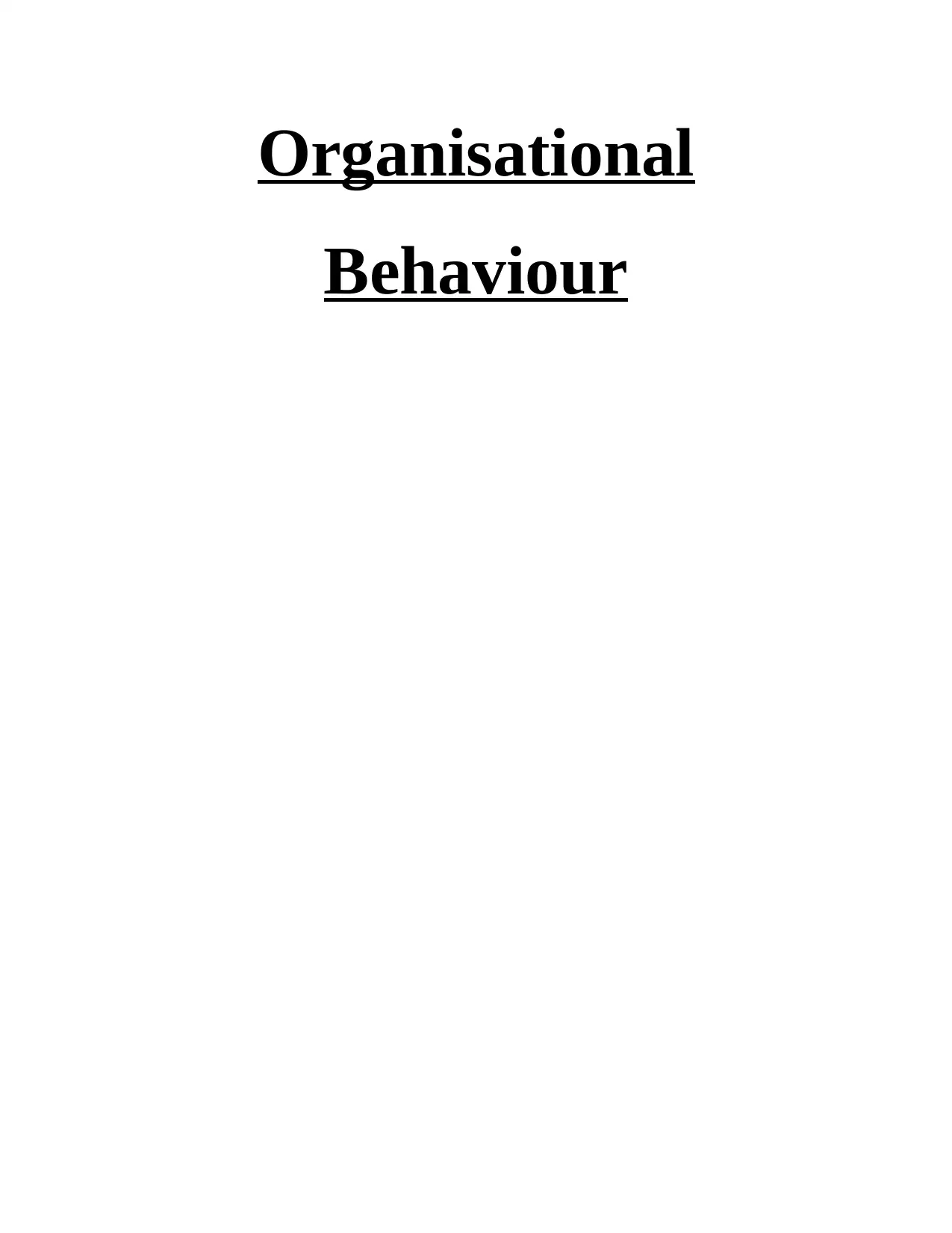
Organisational
Behaviour
Behaviour
Paraphrase This Document
Need a fresh take? Get an instant paraphrase of this document with our AI Paraphraser
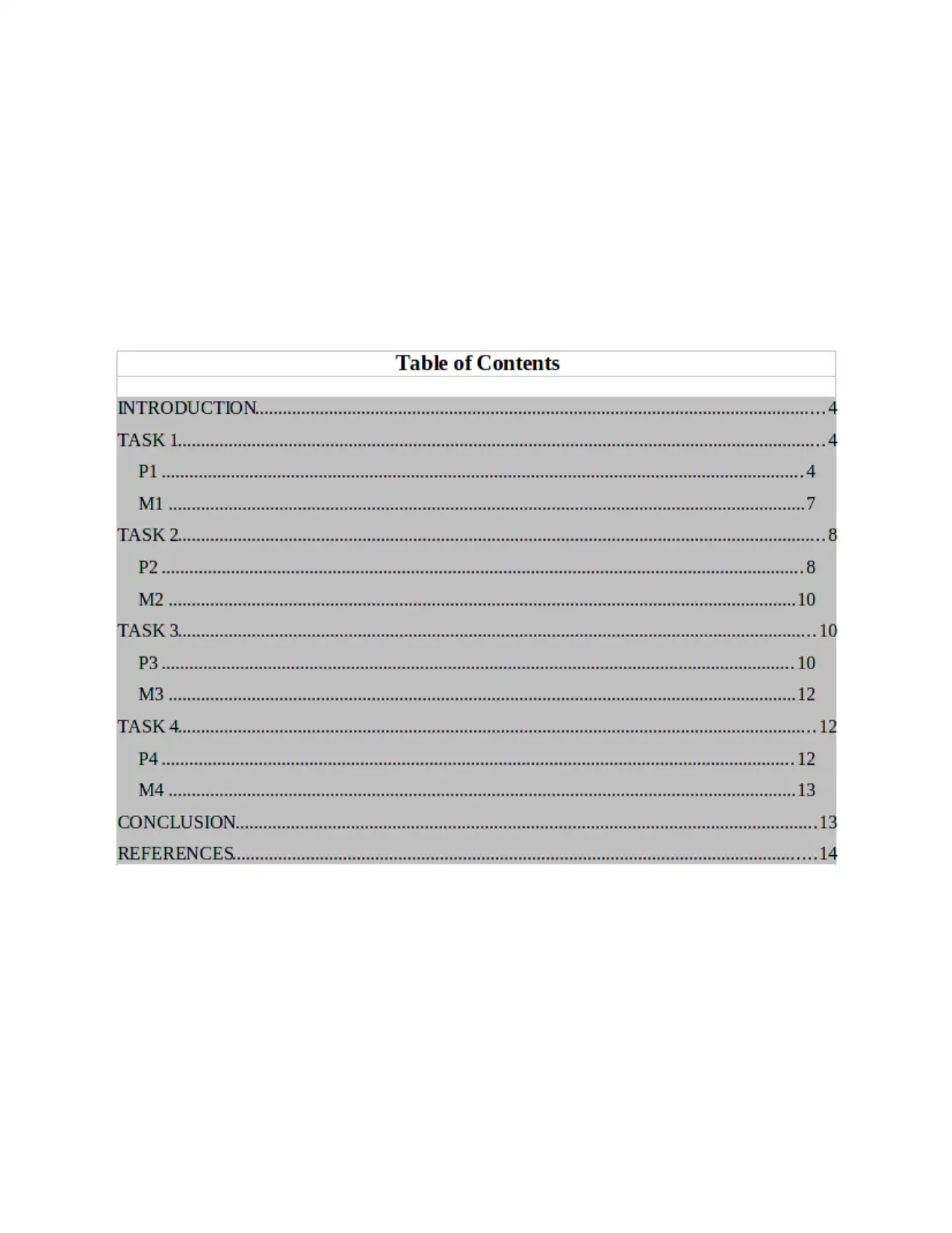

⊘ This is a preview!⊘
Do you want full access?
Subscribe today to unlock all pages.

Trusted by 1+ million students worldwide
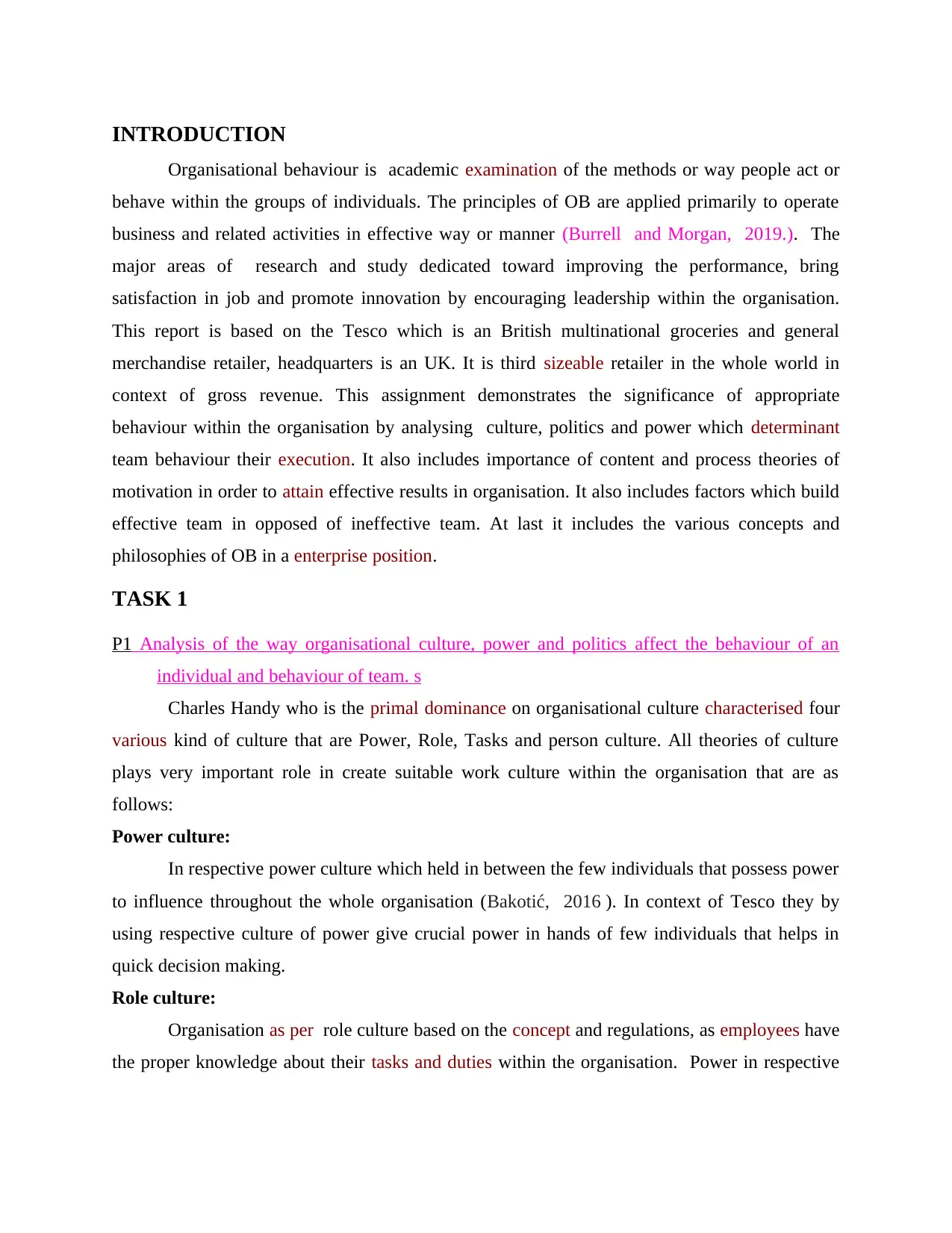
INTRODUCTION
Organisational behaviour is academic examination of the methods or way people act or
behave within the groups of individuals. The principles of OB are applied primarily to operate
business and related activities in effective way or manner (Burrell and Morgan, 2019.). The
major areas of research and study dedicated toward improving the performance, bring
satisfaction in job and promote innovation by encouraging leadership within the organisation.
This report is based on the Tesco which is an British multinational groceries and general
merchandise retailer, headquarters is an UK. It is third sizeable retailer in the whole world in
context of gross revenue. This assignment demonstrates the significance of appropriate
behaviour within the organisation by analysing culture, politics and power which determinant
team behaviour their execution. It also includes importance of content and process theories of
motivation in order to attain effective results in organisation. It also includes factors which build
effective team in opposed of ineffective team. At last it includes the various concepts and
philosophies of OB in a enterprise position.
TASK 1
P1 Analysis of the way organisational culture, power and politics affect the behaviour of an
individual and behaviour of team. s
Charles Handy who is the primal dominance on organisational culture characterised four
various kind of culture that are Power, Role, Tasks and person culture. All theories of culture
plays very important role in create suitable work culture within the organisation that are as
follows:
Power culture:
In respective power culture which held in between the few individuals that possess power
to influence throughout the whole organisation (Bakotić, 2016 ). In context of Tesco they by
using respective culture of power give crucial power in hands of few individuals that helps in
quick decision making.
Role culture:
Organisation as per role culture based on the concept and regulations, as employees have
the proper knowledge about their tasks and duties within the organisation. Power in respective
Organisational behaviour is academic examination of the methods or way people act or
behave within the groups of individuals. The principles of OB are applied primarily to operate
business and related activities in effective way or manner (Burrell and Morgan, 2019.). The
major areas of research and study dedicated toward improving the performance, bring
satisfaction in job and promote innovation by encouraging leadership within the organisation.
This report is based on the Tesco which is an British multinational groceries and general
merchandise retailer, headquarters is an UK. It is third sizeable retailer in the whole world in
context of gross revenue. This assignment demonstrates the significance of appropriate
behaviour within the organisation by analysing culture, politics and power which determinant
team behaviour their execution. It also includes importance of content and process theories of
motivation in order to attain effective results in organisation. It also includes factors which build
effective team in opposed of ineffective team. At last it includes the various concepts and
philosophies of OB in a enterprise position.
TASK 1
P1 Analysis of the way organisational culture, power and politics affect the behaviour of an
individual and behaviour of team. s
Charles Handy who is the primal dominance on organisational culture characterised four
various kind of culture that are Power, Role, Tasks and person culture. All theories of culture
plays very important role in create suitable work culture within the organisation that are as
follows:
Power culture:
In respective power culture which held in between the few individuals that possess power
to influence throughout the whole organisation (Bakotić, 2016 ). In context of Tesco they by
using respective culture of power give crucial power in hands of few individuals that helps in
quick decision making.
Role culture:
Organisation as per role culture based on the concept and regulations, as employees have
the proper knowledge about their tasks and duties within the organisation. Power in respective
Paraphrase This Document
Need a fresh take? Get an instant paraphrase of this document with our AI Paraphraser
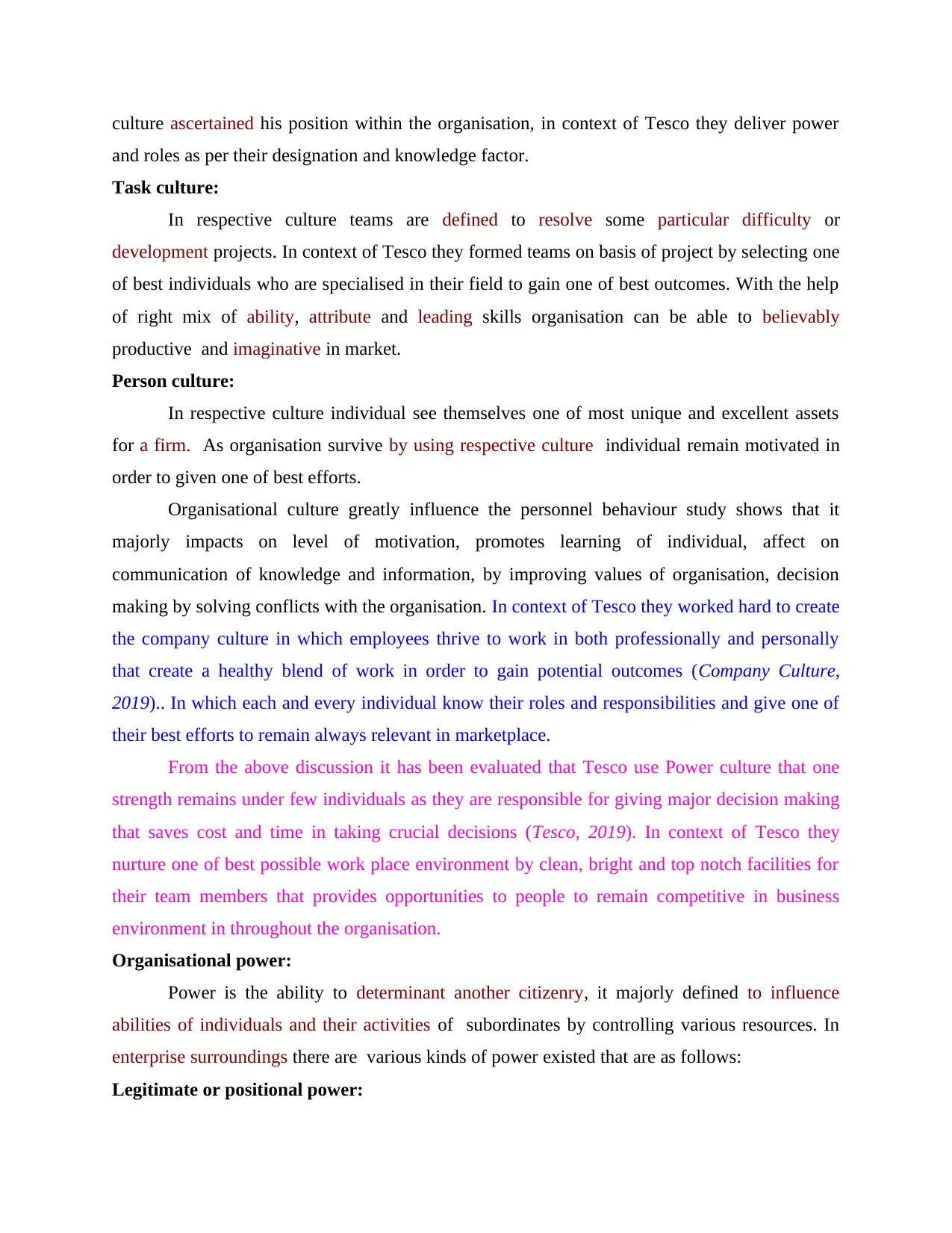
culture ascertained his position within the organisation, in context of Tesco they deliver power
and roles as per their designation and knowledge factor.
Task culture:
In respective culture teams are defined to resolve some particular difficulty or
development projects. In context of Tesco they formed teams on basis of project by selecting one
of best individuals who are specialised in their field to gain one of best outcomes. With the help
of right mix of ability, attribute and leading skills organisation can be able to believably
productive and imaginative in market.
Person culture:
In respective culture individual see themselves one of most unique and excellent assets
for a firm. As organisation survive by using respective culture individual remain motivated in
order to given one of best efforts.
Organisational culture greatly influence the personnel behaviour study shows that it
majorly impacts on level of motivation, promotes learning of individual, affect on
communication of knowledge and information, by improving values of organisation, decision
making by solving conflicts with the organisation. In context of Tesco they worked hard to create
the company culture in which employees thrive to work in both professionally and personally
that create a healthy blend of work in order to gain potential outcomes (Company Culture,
2019).. In which each and every individual know their roles and responsibilities and give one of
their best efforts to remain always relevant in marketplace.
From the above discussion it has been evaluated that Tesco use Power culture that one
strength remains under few individuals as they are responsible for giving major decision making
that saves cost and time in taking crucial decisions (Tesco, 2019). In context of Tesco they
nurture one of best possible work place environment by clean, bright and top notch facilities for
their team members that provides opportunities to people to remain competitive in business
environment in throughout the organisation.
Organisational power:
Power is the ability to determinant another citizenry, it majorly defined to influence
abilities of individuals and their activities of subordinates by controlling various resources. In
enterprise surroundings there are various kinds of power existed that are as follows:
Legitimate or positional power:
and roles as per their designation and knowledge factor.
Task culture:
In respective culture teams are defined to resolve some particular difficulty or
development projects. In context of Tesco they formed teams on basis of project by selecting one
of best individuals who are specialised in their field to gain one of best outcomes. With the help
of right mix of ability, attribute and leading skills organisation can be able to believably
productive and imaginative in market.
Person culture:
In respective culture individual see themselves one of most unique and excellent assets
for a firm. As organisation survive by using respective culture individual remain motivated in
order to given one of best efforts.
Organisational culture greatly influence the personnel behaviour study shows that it
majorly impacts on level of motivation, promotes learning of individual, affect on
communication of knowledge and information, by improving values of organisation, decision
making by solving conflicts with the organisation. In context of Tesco they worked hard to create
the company culture in which employees thrive to work in both professionally and personally
that create a healthy blend of work in order to gain potential outcomes (Company Culture,
2019).. In which each and every individual know their roles and responsibilities and give one of
their best efforts to remain always relevant in marketplace.
From the above discussion it has been evaluated that Tesco use Power culture that one
strength remains under few individuals as they are responsible for giving major decision making
that saves cost and time in taking crucial decisions (Tesco, 2019). In context of Tesco they
nurture one of best possible work place environment by clean, bright and top notch facilities for
their team members that provides opportunities to people to remain competitive in business
environment in throughout the organisation.
Organisational power:
Power is the ability to determinant another citizenry, it majorly defined to influence
abilities of individuals and their activities of subordinates by controlling various resources. In
enterprise surroundings there are various kinds of power existed that are as follows:
Legitimate or positional power:
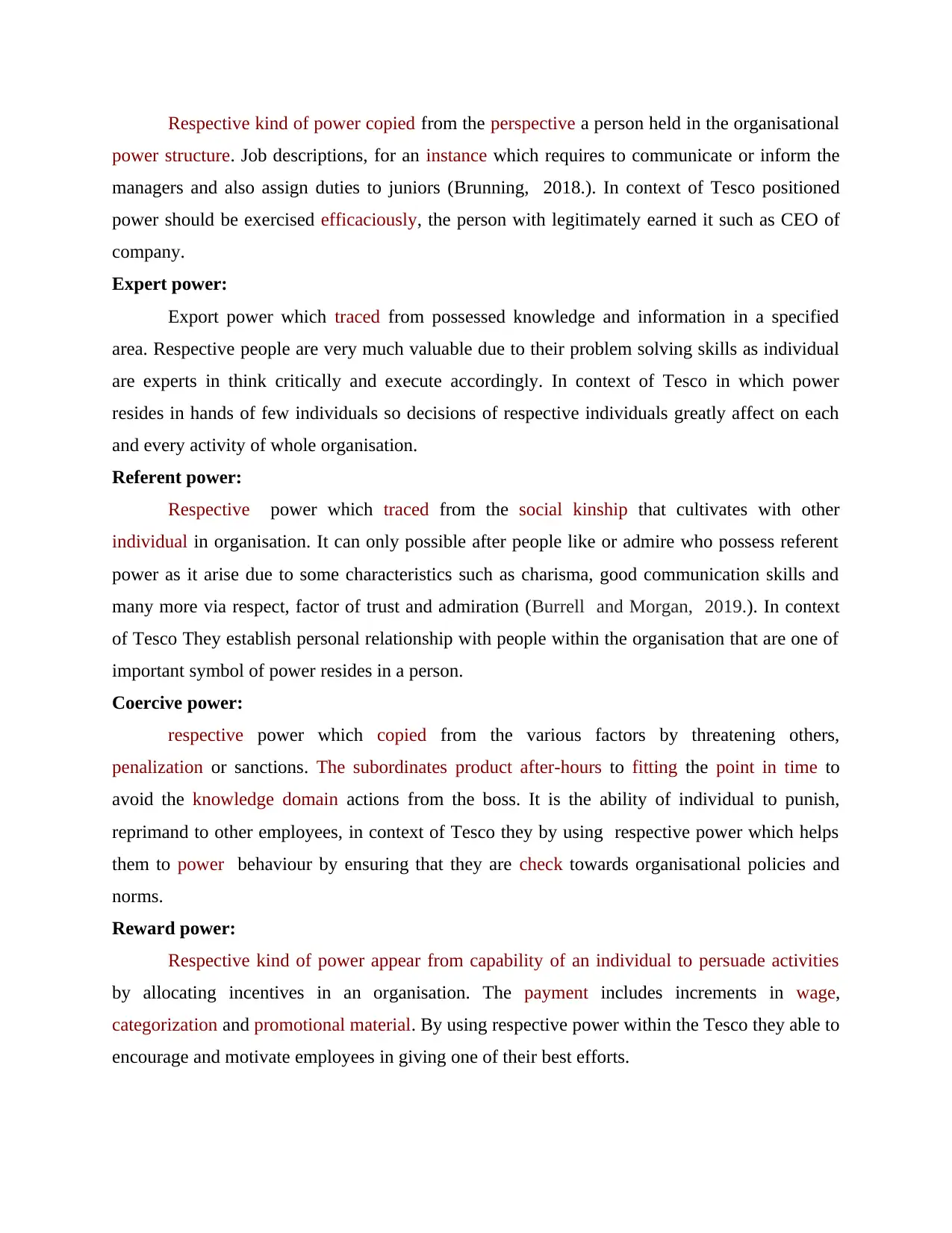
Respective kind of power copied from the perspective a person held in the organisational
power structure. Job descriptions, for an instance which requires to communicate or inform the
managers and also assign duties to juniors (Brunning, 2018.). In context of Tesco positioned
power should be exercised efficaciously, the person with legitimately earned it such as CEO of
company.
Expert power:
Export power which traced from possessed knowledge and information in a specified
area. Respective people are very much valuable due to their problem solving skills as individual
are experts in think critically and execute accordingly. In context of Tesco in which power
resides in hands of few individuals so decisions of respective individuals greatly affect on each
and every activity of whole organisation.
Referent power:
Respective power which traced from the social kinship that cultivates with other
individual in organisation. It can only possible after people like or admire who possess referent
power as it arise due to some characteristics such as charisma, good communication skills and
many more via respect, factor of trust and admiration (Burrell and Morgan, 2019.). In context
of Tesco They establish personal relationship with people within the organisation that are one of
important symbol of power resides in a person.
Coercive power:
respective power which copied from the various factors by threatening others,
penalization or sanctions. The subordinates product after-hours to fitting the point in time to
avoid the knowledge domain actions from the boss. It is the ability of individual to punish,
reprimand to other employees, in context of Tesco they by using respective power which helps
them to power behaviour by ensuring that they are check towards organisational policies and
norms.
Reward power:
Respective kind of power appear from capability of an individual to persuade activities
by allocating incentives in an organisation. The payment includes increments in wage,
categorization and promotional material. By using respective power within the Tesco they able to
encourage and motivate employees in giving one of their best efforts.
power structure. Job descriptions, for an instance which requires to communicate or inform the
managers and also assign duties to juniors (Brunning, 2018.). In context of Tesco positioned
power should be exercised efficaciously, the person with legitimately earned it such as CEO of
company.
Expert power:
Export power which traced from possessed knowledge and information in a specified
area. Respective people are very much valuable due to their problem solving skills as individual
are experts in think critically and execute accordingly. In context of Tesco in which power
resides in hands of few individuals so decisions of respective individuals greatly affect on each
and every activity of whole organisation.
Referent power:
Respective power which traced from the social kinship that cultivates with other
individual in organisation. It can only possible after people like or admire who possess referent
power as it arise due to some characteristics such as charisma, good communication skills and
many more via respect, factor of trust and admiration (Burrell and Morgan, 2019.). In context
of Tesco They establish personal relationship with people within the organisation that are one of
important symbol of power resides in a person.
Coercive power:
respective power which copied from the various factors by threatening others,
penalization or sanctions. The subordinates product after-hours to fitting the point in time to
avoid the knowledge domain actions from the boss. It is the ability of individual to punish,
reprimand to other employees, in context of Tesco they by using respective power which helps
them to power behaviour by ensuring that they are check towards organisational policies and
norms.
Reward power:
Respective kind of power appear from capability of an individual to persuade activities
by allocating incentives in an organisation. The payment includes increments in wage,
categorization and promotional material. By using respective power within the Tesco they able to
encourage and motivate employees in giving one of their best efforts.
⊘ This is a preview!⊘
Do you want full access?
Subscribe today to unlock all pages.

Trusted by 1+ million students worldwide
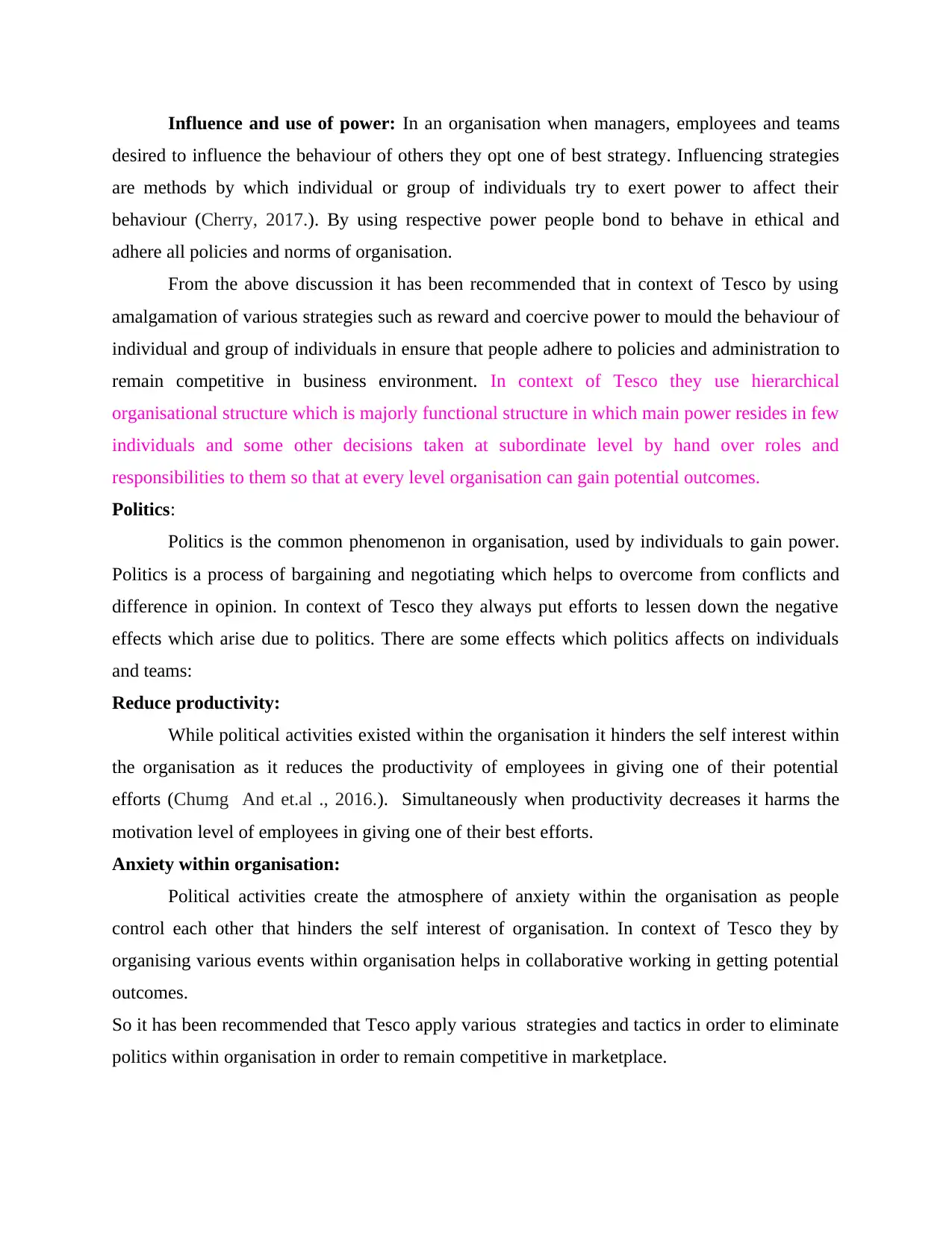
Influence and use of power: In an organisation when managers, employees and teams
desired to influence the behaviour of others they opt one of best strategy. Influencing strategies
are methods by which individual or group of individuals try to exert power to affect their
behaviour (Cherry, 2017.). By using respective power people bond to behave in ethical and
adhere all policies and norms of organisation.
From the above discussion it has been recommended that in context of Tesco by using
amalgamation of various strategies such as reward and coercive power to mould the behaviour of
individual and group of individuals in ensure that people adhere to policies and administration to
remain competitive in business environment. In context of Tesco they use hierarchical
organisational structure which is majorly functional structure in which main power resides in few
individuals and some other decisions taken at subordinate level by hand over roles and
responsibilities to them so that at every level organisation can gain potential outcomes.
Politics:
Politics is the common phenomenon in organisation, used by individuals to gain power.
Politics is a process of bargaining and negotiating which helps to overcome from conflicts and
difference in opinion. In context of Tesco they always put efforts to lessen down the negative
effects which arise due to politics. There are some effects which politics affects on individuals
and teams:
Reduce productivity:
While political activities existed within the organisation it hinders the self interest within
the organisation as it reduces the productivity of employees in giving one of their potential
efforts (Chumg And et.al ., 2016.). Simultaneously when productivity decreases it harms the
motivation level of employees in giving one of their best efforts.
Anxiety within organisation:
Political activities create the atmosphere of anxiety within the organisation as people
control each other that hinders the self interest of organisation. In context of Tesco they by
organising various events within organisation helps in collaborative working in getting potential
outcomes.
So it has been recommended that Tesco apply various strategies and tactics in order to eliminate
politics within organisation in order to remain competitive in marketplace.
desired to influence the behaviour of others they opt one of best strategy. Influencing strategies
are methods by which individual or group of individuals try to exert power to affect their
behaviour (Cherry, 2017.). By using respective power people bond to behave in ethical and
adhere all policies and norms of organisation.
From the above discussion it has been recommended that in context of Tesco by using
amalgamation of various strategies such as reward and coercive power to mould the behaviour of
individual and group of individuals in ensure that people adhere to policies and administration to
remain competitive in business environment. In context of Tesco they use hierarchical
organisational structure which is majorly functional structure in which main power resides in few
individuals and some other decisions taken at subordinate level by hand over roles and
responsibilities to them so that at every level organisation can gain potential outcomes.
Politics:
Politics is the common phenomenon in organisation, used by individuals to gain power.
Politics is a process of bargaining and negotiating which helps to overcome from conflicts and
difference in opinion. In context of Tesco they always put efforts to lessen down the negative
effects which arise due to politics. There are some effects which politics affects on individuals
and teams:
Reduce productivity:
While political activities existed within the organisation it hinders the self interest within
the organisation as it reduces the productivity of employees in giving one of their potential
efforts (Chumg And et.al ., 2016.). Simultaneously when productivity decreases it harms the
motivation level of employees in giving one of their best efforts.
Anxiety within organisation:
Political activities create the atmosphere of anxiety within the organisation as people
control each other that hinders the self interest of organisation. In context of Tesco they by
organising various events within organisation helps in collaborative working in getting potential
outcomes.
So it has been recommended that Tesco apply various strategies and tactics in order to eliminate
politics within organisation in order to remain competitive in marketplace.
Paraphrase This Document
Need a fresh take? Get an instant paraphrase of this document with our AI Paraphraser
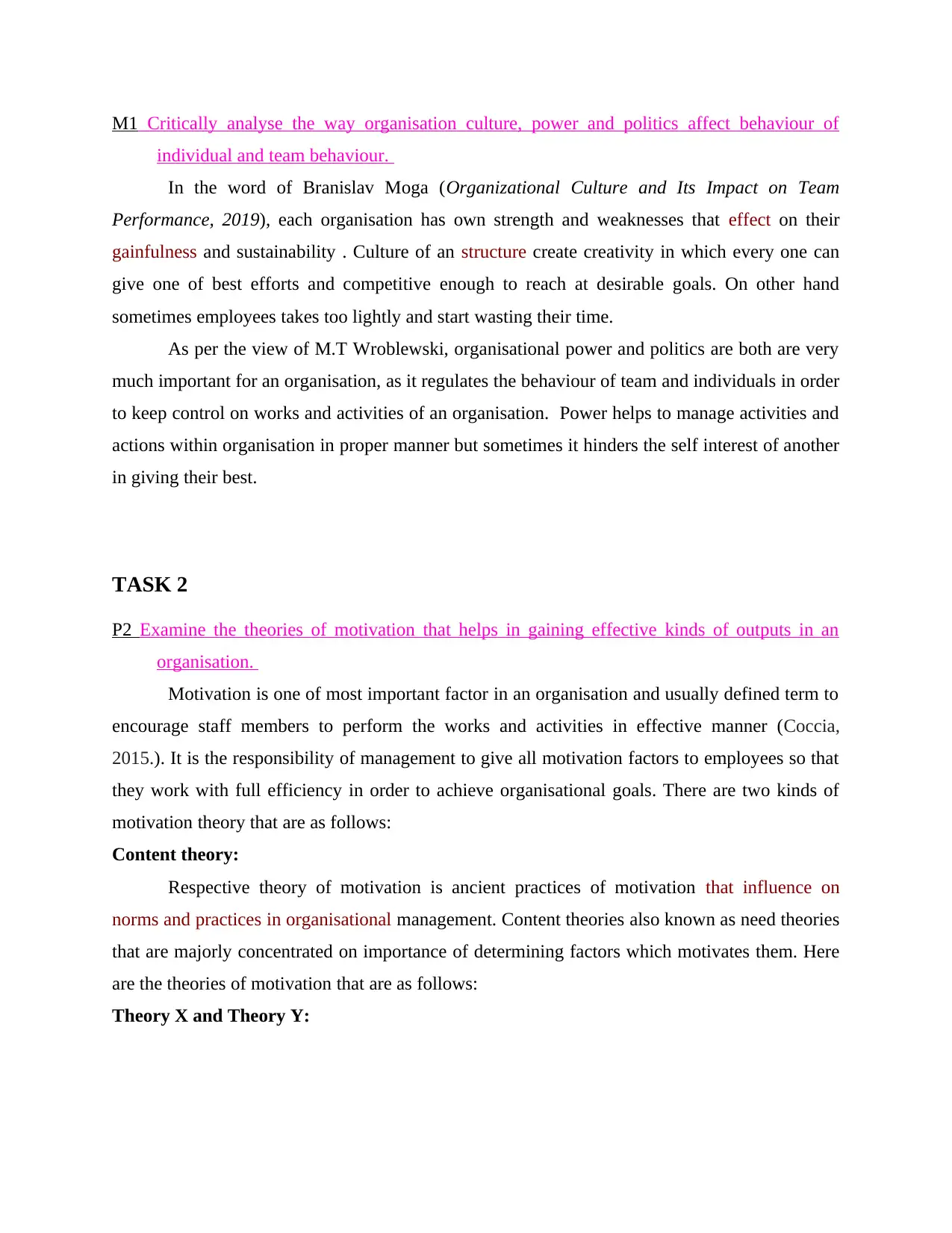
M1 Critically analyse the way organisation culture, power and politics affect behaviour of
individual and team behaviour.
In the word of Branislav Moga (Organizational Culture and Its Impact on Team
Performance, 2019), each organisation has own strength and weaknesses that effect on their
gainfulness and sustainability . Culture of an structure create creativity in which every one can
give one of best efforts and competitive enough to reach at desirable goals. On other hand
sometimes employees takes too lightly and start wasting their time.
As per the view of M.T Wroblewski, organisational power and politics are both are very
much important for an organisation, as it regulates the behaviour of team and individuals in order
to keep control on works and activities of an organisation. Power helps to manage activities and
actions within organisation in proper manner but sometimes it hinders the self interest of another
in giving their best.
TASK 2
P2 Examine the theories of motivation that helps in gaining effective kinds of outputs in an
organisation.
Motivation is one of most important factor in an organisation and usually defined term to
encourage staff members to perform the works and activities in effective manner (Coccia,
2015.). It is the responsibility of management to give all motivation factors to employees so that
they work with full efficiency in order to achieve organisational goals. There are two kinds of
motivation theory that are as follows:
Content theory:
Respective theory of motivation is ancient practices of motivation that influence on
norms and practices in organisational management. Content theories also known as need theories
that are majorly concentrated on importance of determining factors which motivates them. Here
are the theories of motivation that are as follows:
Theory X and Theory Y:
individual and team behaviour.
In the word of Branislav Moga (Organizational Culture and Its Impact on Team
Performance, 2019), each organisation has own strength and weaknesses that effect on their
gainfulness and sustainability . Culture of an structure create creativity in which every one can
give one of best efforts and competitive enough to reach at desirable goals. On other hand
sometimes employees takes too lightly and start wasting their time.
As per the view of M.T Wroblewski, organisational power and politics are both are very
much important for an organisation, as it regulates the behaviour of team and individuals in order
to keep control on works and activities of an organisation. Power helps to manage activities and
actions within organisation in proper manner but sometimes it hinders the self interest of another
in giving their best.
TASK 2
P2 Examine the theories of motivation that helps in gaining effective kinds of outputs in an
organisation.
Motivation is one of most important factor in an organisation and usually defined term to
encourage staff members to perform the works and activities in effective manner (Coccia,
2015.). It is the responsibility of management to give all motivation factors to employees so that
they work with full efficiency in order to achieve organisational goals. There are two kinds of
motivation theory that are as follows:
Content theory:
Respective theory of motivation is ancient practices of motivation that influence on
norms and practices in organisational management. Content theories also known as need theories
that are majorly concentrated on importance of determining factors which motivates them. Here
are the theories of motivation that are as follows:
Theory X and Theory Y:
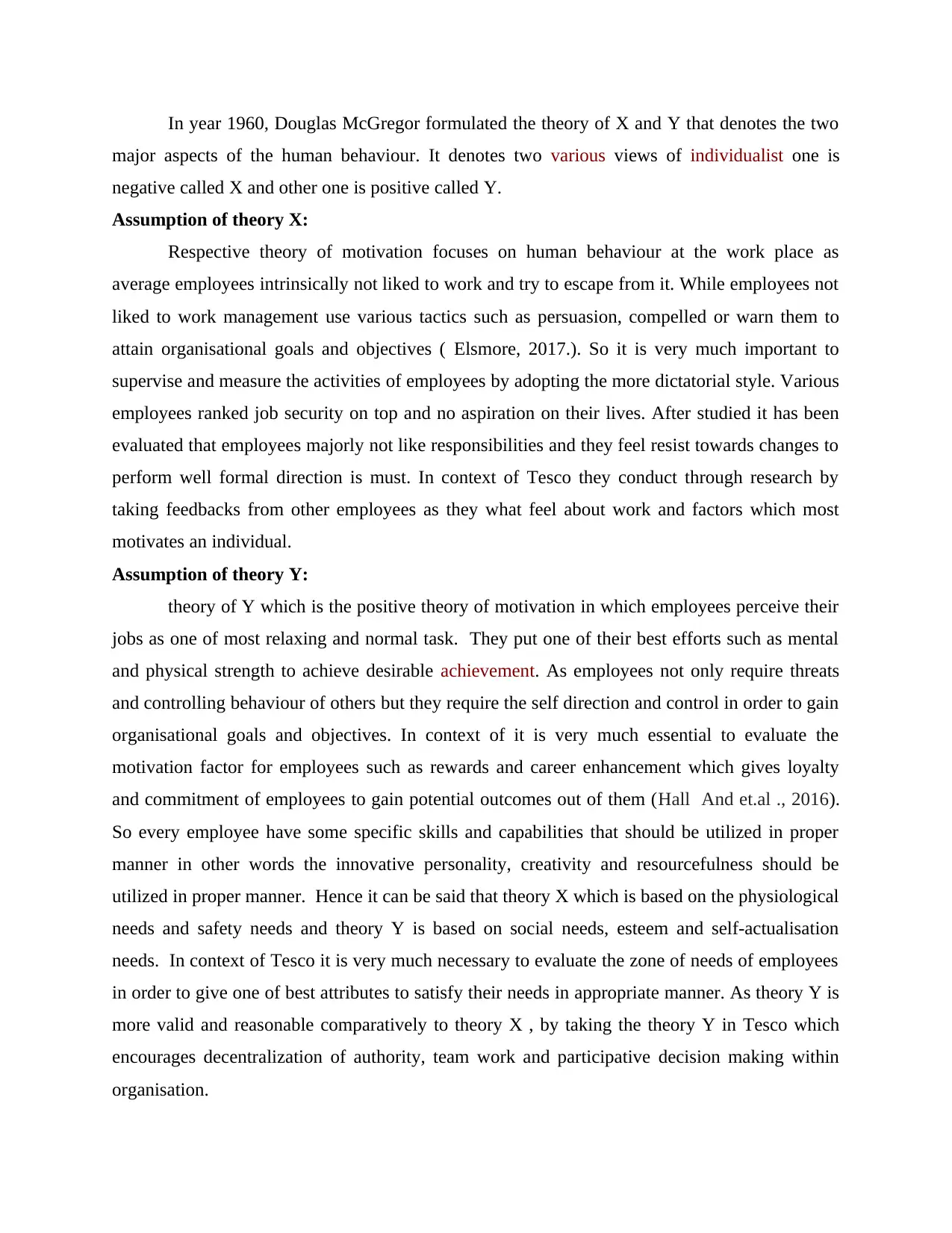
In year 1960, Douglas McGregor formulated the theory of X and Y that denotes the two
major aspects of the human behaviour. It denotes two various views of individualist one is
negative called X and other one is positive called Y.
Assumption of theory X:
Respective theory of motivation focuses on human behaviour at the work place as
average employees intrinsically not liked to work and try to escape from it. While employees not
liked to work management use various tactics such as persuasion, compelled or warn them to
attain organisational goals and objectives ( Elsmore, 2017.). So it is very much important to
supervise and measure the activities of employees by adopting the more dictatorial style. Various
employees ranked job security on top and no aspiration on their lives. After studied it has been
evaluated that employees majorly not like responsibilities and they feel resist towards changes to
perform well formal direction is must. In context of Tesco they conduct through research by
taking feedbacks from other employees as they what feel about work and factors which most
motivates an individual.
Assumption of theory Y:
theory of Y which is the positive theory of motivation in which employees perceive their
jobs as one of most relaxing and normal task. They put one of their best efforts such as mental
and physical strength to achieve desirable achievement. As employees not only require threats
and controlling behaviour of others but they require the self direction and control in order to gain
organisational goals and objectives. In context of it is very much essential to evaluate the
motivation factor for employees such as rewards and career enhancement which gives loyalty
and commitment of employees to gain potential outcomes out of them (Hall And et.al ., 2016).
So every employee have some specific skills and capabilities that should be utilized in proper
manner in other words the innovative personality, creativity and resourcefulness should be
utilized in proper manner. Hence it can be said that theory X which is based on the physiological
needs and safety needs and theory Y is based on social needs, esteem and self-actualisation
needs. In context of Tesco it is very much necessary to evaluate the zone of needs of employees
in order to give one of best attributes to satisfy their needs in appropriate manner. As theory Y is
more valid and reasonable comparatively to theory X , by taking the theory Y in Tesco which
encourages decentralization of authority, team work and participative decision making within
organisation.
major aspects of the human behaviour. It denotes two various views of individualist one is
negative called X and other one is positive called Y.
Assumption of theory X:
Respective theory of motivation focuses on human behaviour at the work place as
average employees intrinsically not liked to work and try to escape from it. While employees not
liked to work management use various tactics such as persuasion, compelled or warn them to
attain organisational goals and objectives ( Elsmore, 2017.). So it is very much important to
supervise and measure the activities of employees by adopting the more dictatorial style. Various
employees ranked job security on top and no aspiration on their lives. After studied it has been
evaluated that employees majorly not like responsibilities and they feel resist towards changes to
perform well formal direction is must. In context of Tesco they conduct through research by
taking feedbacks from other employees as they what feel about work and factors which most
motivates an individual.
Assumption of theory Y:
theory of Y which is the positive theory of motivation in which employees perceive their
jobs as one of most relaxing and normal task. They put one of their best efforts such as mental
and physical strength to achieve desirable achievement. As employees not only require threats
and controlling behaviour of others but they require the self direction and control in order to gain
organisational goals and objectives. In context of it is very much essential to evaluate the
motivation factor for employees such as rewards and career enhancement which gives loyalty
and commitment of employees to gain potential outcomes out of them (Hall And et.al ., 2016).
So every employee have some specific skills and capabilities that should be utilized in proper
manner in other words the innovative personality, creativity and resourcefulness should be
utilized in proper manner. Hence it can be said that theory X which is based on the physiological
needs and safety needs and theory Y is based on social needs, esteem and self-actualisation
needs. In context of Tesco it is very much necessary to evaluate the zone of needs of employees
in order to give one of best attributes to satisfy their needs in appropriate manner. As theory Y is
more valid and reasonable comparatively to theory X , by taking the theory Y in Tesco which
encourages decentralization of authority, team work and participative decision making within
organisation.
⊘ This is a preview!⊘
Do you want full access?
Subscribe today to unlock all pages.

Trusted by 1+ million students worldwide
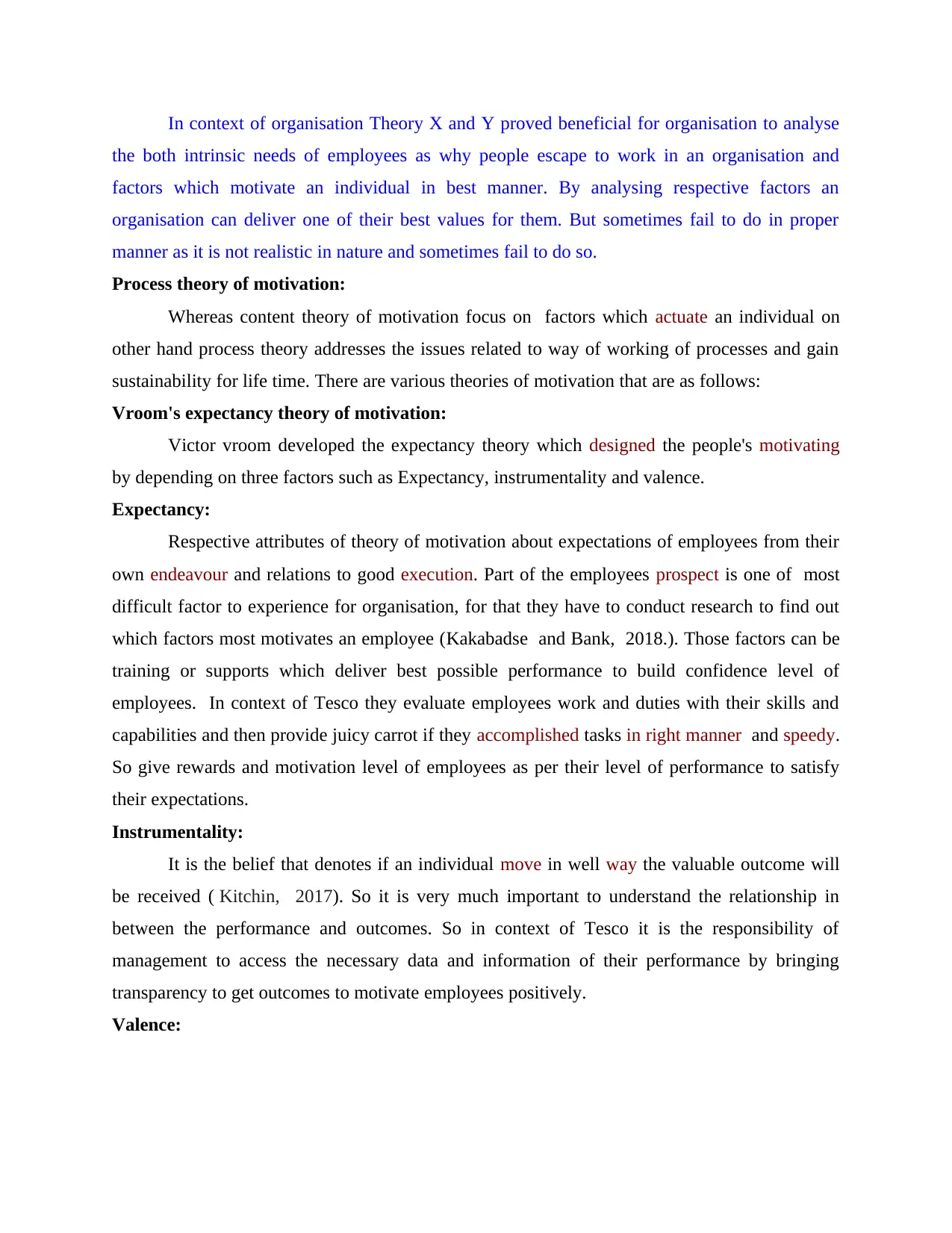
In context of organisation Theory X and Y proved beneficial for organisation to analyse
the both intrinsic needs of employees as why people escape to work in an organisation and
factors which motivate an individual in best manner. By analysing respective factors an
organisation can deliver one of their best values for them. But sometimes fail to do in proper
manner as it is not realistic in nature and sometimes fail to do so.
Process theory of motivation:
Whereas content theory of motivation focus on factors which actuate an individual on
other hand process theory addresses the issues related to way of working of processes and gain
sustainability for life time. There are various theories of motivation that are as follows:
Vroom's expectancy theory of motivation:
Victor vroom developed the expectancy theory which designed the people's motivating
by depending on three factors such as Expectancy, instrumentality and valence.
Expectancy:
Respective attributes of theory of motivation about expectations of employees from their
own endeavour and relations to good execution. Part of the employees prospect is one of most
difficult factor to experience for organisation, for that they have to conduct research to find out
which factors most motivates an employee (Kakabadse and Bank, 2018.). Those factors can be
training or supports which deliver best possible performance to build confidence level of
employees. In context of Tesco they evaluate employees work and duties with their skills and
capabilities and then provide juicy carrot if they accomplished tasks in right manner and speedy.
So give rewards and motivation level of employees as per their level of performance to satisfy
their expectations.
Instrumentality:
It is the belief that denotes if an individual move in well way the valuable outcome will
be received ( Kitchin, 2017). So it is very much important to understand the relationship in
between the performance and outcomes. So in context of Tesco it is the responsibility of
management to access the necessary data and information of their performance by bringing
transparency to get outcomes to motivate employees positively.
Valence:
the both intrinsic needs of employees as why people escape to work in an organisation and
factors which motivate an individual in best manner. By analysing respective factors an
organisation can deliver one of their best values for them. But sometimes fail to do in proper
manner as it is not realistic in nature and sometimes fail to do so.
Process theory of motivation:
Whereas content theory of motivation focus on factors which actuate an individual on
other hand process theory addresses the issues related to way of working of processes and gain
sustainability for life time. There are various theories of motivation that are as follows:
Vroom's expectancy theory of motivation:
Victor vroom developed the expectancy theory which designed the people's motivating
by depending on three factors such as Expectancy, instrumentality and valence.
Expectancy:
Respective attributes of theory of motivation about expectations of employees from their
own endeavour and relations to good execution. Part of the employees prospect is one of most
difficult factor to experience for organisation, for that they have to conduct research to find out
which factors most motivates an employee (Kakabadse and Bank, 2018.). Those factors can be
training or supports which deliver best possible performance to build confidence level of
employees. In context of Tesco they evaluate employees work and duties with their skills and
capabilities and then provide juicy carrot if they accomplished tasks in right manner and speedy.
So give rewards and motivation level of employees as per their level of performance to satisfy
their expectations.
Instrumentality:
It is the belief that denotes if an individual move in well way the valuable outcome will
be received ( Kitchin, 2017). So it is very much important to understand the relationship in
between the performance and outcomes. So in context of Tesco it is the responsibility of
management to access the necessary data and information of their performance by bringing
transparency to get outcomes to motivate employees positively.
Valence:
Paraphrase This Document
Need a fresh take? Get an instant paraphrase of this document with our AI Paraphraser
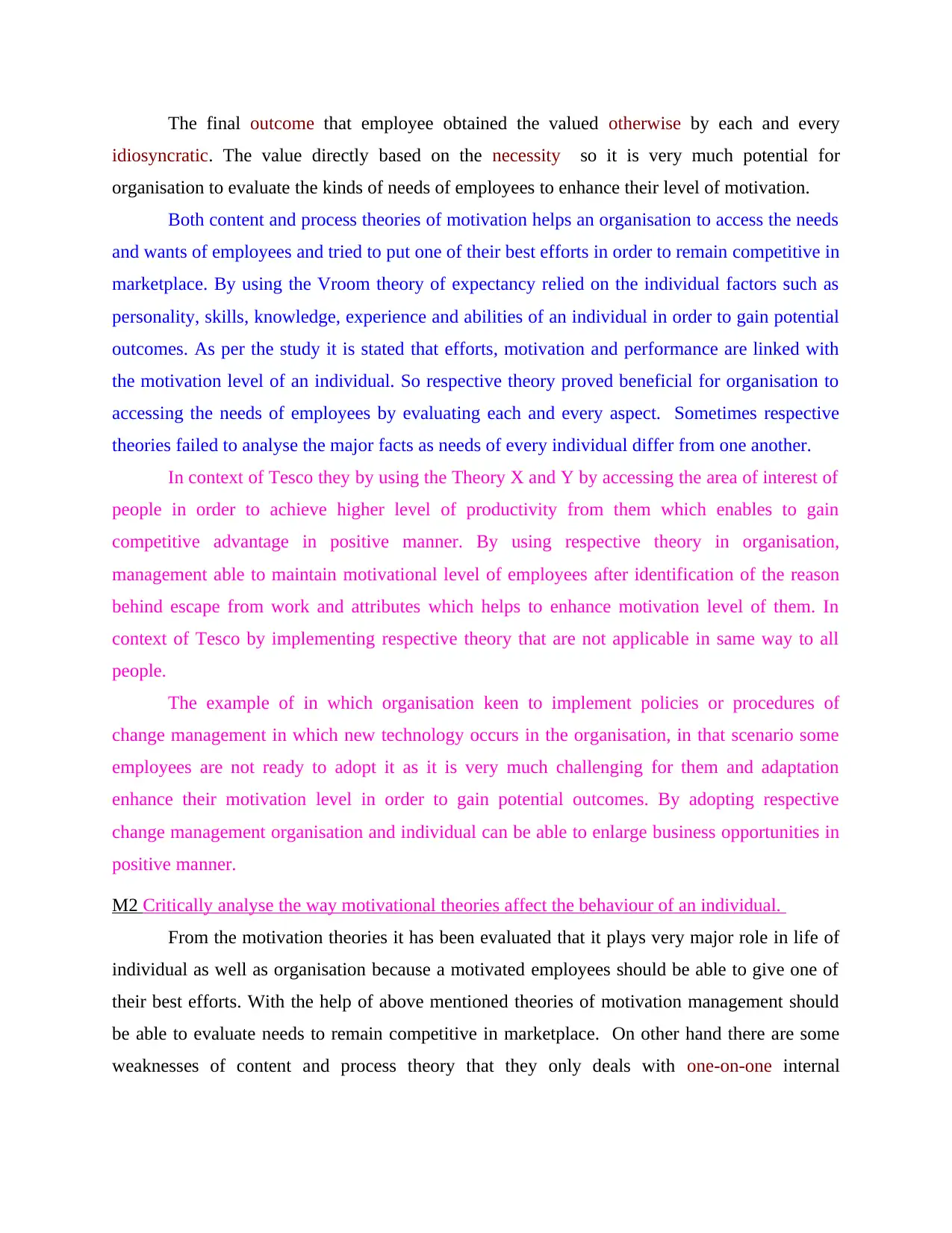
The final outcome that employee obtained the valued otherwise by each and every
idiosyncratic. The value directly based on the necessity so it is very much potential for
organisation to evaluate the kinds of needs of employees to enhance their level of motivation.
Both content and process theories of motivation helps an organisation to access the needs
and wants of employees and tried to put one of their best efforts in order to remain competitive in
marketplace. By using the Vroom theory of expectancy relied on the individual factors such as
personality, skills, knowledge, experience and abilities of an individual in order to gain potential
outcomes. As per the study it is stated that efforts, motivation and performance are linked with
the motivation level of an individual. So respective theory proved beneficial for organisation to
accessing the needs of employees by evaluating each and every aspect. Sometimes respective
theories failed to analyse the major facts as needs of every individual differ from one another.
In context of Tesco they by using the Theory X and Y by accessing the area of interest of
people in order to achieve higher level of productivity from them which enables to gain
competitive advantage in positive manner. By using respective theory in organisation,
management able to maintain motivational level of employees after identification of the reason
behind escape from work and attributes which helps to enhance motivation level of them. In
context of Tesco by implementing respective theory that are not applicable in same way to all
people.
The example of in which organisation keen to implement policies or procedures of
change management in which new technology occurs in the organisation, in that scenario some
employees are not ready to adopt it as it is very much challenging for them and adaptation
enhance their motivation level in order to gain potential outcomes. By adopting respective
change management organisation and individual can be able to enlarge business opportunities in
positive manner.
M2 Critically analyse the way motivational theories affect the behaviour of an individual.
From the motivation theories it has been evaluated that it plays very major role in life of
individual as well as organisation because a motivated employees should be able to give one of
their best efforts. With the help of above mentioned theories of motivation management should
be able to evaluate needs to remain competitive in marketplace. On other hand there are some
weaknesses of content and process theory that they only deals with one-on-one internal
idiosyncratic. The value directly based on the necessity so it is very much potential for
organisation to evaluate the kinds of needs of employees to enhance their level of motivation.
Both content and process theories of motivation helps an organisation to access the needs
and wants of employees and tried to put one of their best efforts in order to remain competitive in
marketplace. By using the Vroom theory of expectancy relied on the individual factors such as
personality, skills, knowledge, experience and abilities of an individual in order to gain potential
outcomes. As per the study it is stated that efforts, motivation and performance are linked with
the motivation level of an individual. So respective theory proved beneficial for organisation to
accessing the needs of employees by evaluating each and every aspect. Sometimes respective
theories failed to analyse the major facts as needs of every individual differ from one another.
In context of Tesco they by using the Theory X and Y by accessing the area of interest of
people in order to achieve higher level of productivity from them which enables to gain
competitive advantage in positive manner. By using respective theory in organisation,
management able to maintain motivational level of employees after identification of the reason
behind escape from work and attributes which helps to enhance motivation level of them. In
context of Tesco by implementing respective theory that are not applicable in same way to all
people.
The example of in which organisation keen to implement policies or procedures of
change management in which new technology occurs in the organisation, in that scenario some
employees are not ready to adopt it as it is very much challenging for them and adaptation
enhance their motivation level in order to gain potential outcomes. By adopting respective
change management organisation and individual can be able to enlarge business opportunities in
positive manner.
M2 Critically analyse the way motivational theories affect the behaviour of an individual.
From the motivation theories it has been evaluated that it plays very major role in life of
individual as well as organisation because a motivated employees should be able to give one of
their best efforts. With the help of above mentioned theories of motivation management should
be able to evaluate needs to remain competitive in marketplace. On other hand there are some
weaknesses of content and process theory that they only deals with one-on-one internal
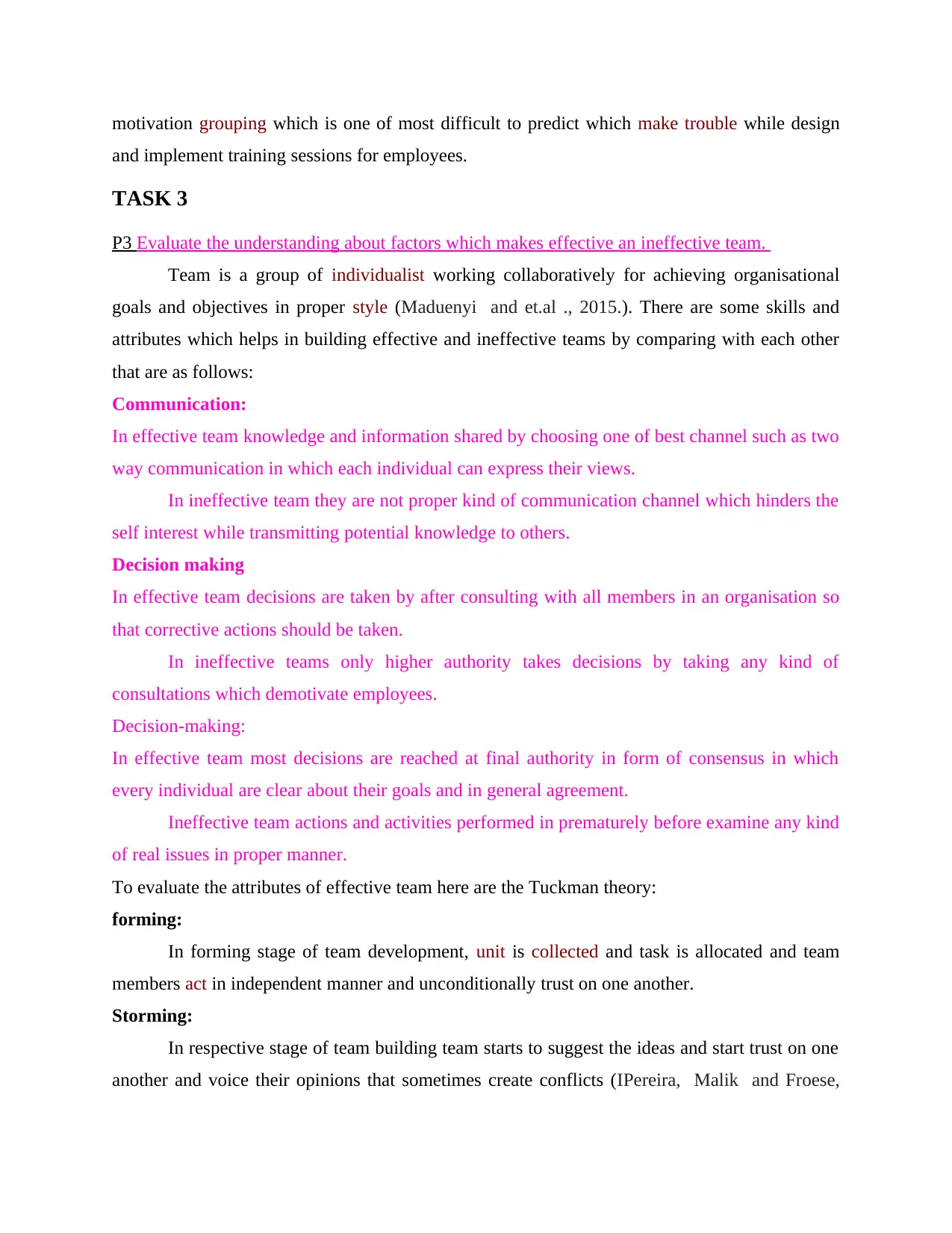
motivation grouping which is one of most difficult to predict which make trouble while design
and implement training sessions for employees.
TASK 3
P3 Evaluate the understanding about factors which makes effective an ineffective team.
Team is a group of individualist working collaboratively for achieving organisational
goals and objectives in proper style (Maduenyi and et.al ., 2015.). There are some skills and
attributes which helps in building effective and ineffective teams by comparing with each other
that are as follows:
Communication:
In effective team knowledge and information shared by choosing one of best channel such as two
way communication in which each individual can express their views.
In ineffective team they are not proper kind of communication channel which hinders the
self interest while transmitting potential knowledge to others.
Decision making
In effective team decisions are taken by after consulting with all members in an organisation so
that corrective actions should be taken.
In ineffective teams only higher authority takes decisions by taking any kind of
consultations which demotivate employees.
Decision-making:
In effective team most decisions are reached at final authority in form of consensus in which
every individual are clear about their goals and in general agreement.
Ineffective team actions and activities performed in prematurely before examine any kind
of real issues in proper manner.
To evaluate the attributes of effective team here are the Tuckman theory:
forming:
In forming stage of team development, unit is collected and task is allocated and team
members act in independent manner and unconditionally trust on one another.
Storming:
In respective stage of team building team starts to suggest the ideas and start trust on one
another and voice their opinions that sometimes create conflicts (IPereira, Malik and Froese,
and implement training sessions for employees.
TASK 3
P3 Evaluate the understanding about factors which makes effective an ineffective team.
Team is a group of individualist working collaboratively for achieving organisational
goals and objectives in proper style (Maduenyi and et.al ., 2015.). There are some skills and
attributes which helps in building effective and ineffective teams by comparing with each other
that are as follows:
Communication:
In effective team knowledge and information shared by choosing one of best channel such as two
way communication in which each individual can express their views.
In ineffective team they are not proper kind of communication channel which hinders the
self interest while transmitting potential knowledge to others.
Decision making
In effective team decisions are taken by after consulting with all members in an organisation so
that corrective actions should be taken.
In ineffective teams only higher authority takes decisions by taking any kind of
consultations which demotivate employees.
Decision-making:
In effective team most decisions are reached at final authority in form of consensus in which
every individual are clear about their goals and in general agreement.
Ineffective team actions and activities performed in prematurely before examine any kind
of real issues in proper manner.
To evaluate the attributes of effective team here are the Tuckman theory:
forming:
In forming stage of team development, unit is collected and task is allocated and team
members act in independent manner and unconditionally trust on one another.
Storming:
In respective stage of team building team starts to suggest the ideas and start trust on one
another and voice their opinions that sometimes create conflicts (IPereira, Malik and Froese,
⊘ This is a preview!⊘
Do you want full access?
Subscribe today to unlock all pages.

Trusted by 1+ million students worldwide
1 out of 18
Related Documents
Your All-in-One AI-Powered Toolkit for Academic Success.
+13062052269
info@desklib.com
Available 24*7 on WhatsApp / Email
![[object Object]](/_next/static/media/star-bottom.7253800d.svg)
Unlock your academic potential
Copyright © 2020–2026 A2Z Services. All Rights Reserved. Developed and managed by ZUCOL.





